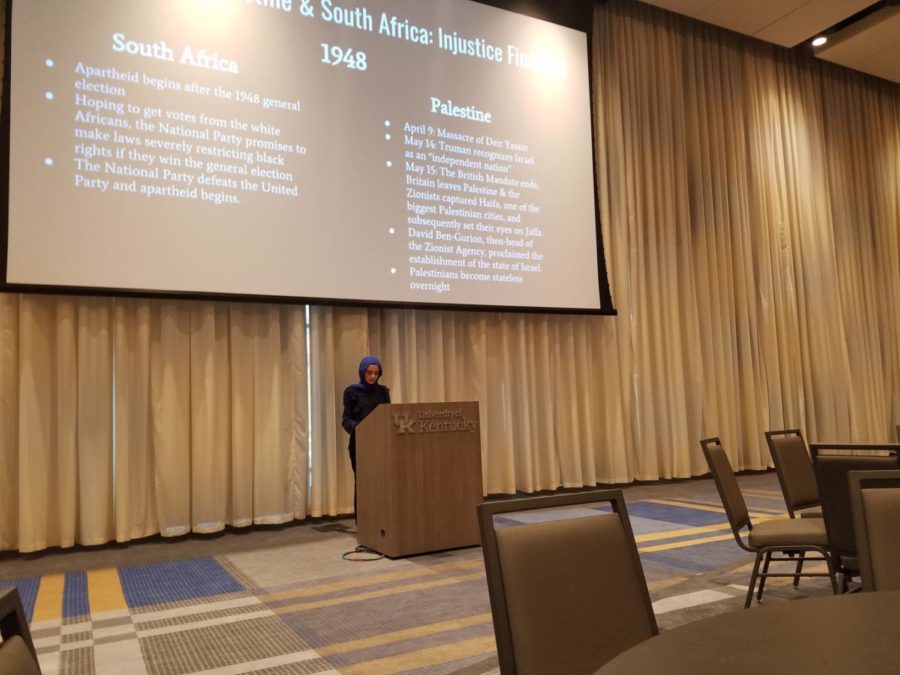Rhodes Scholar, UK student compares Israel-Palestine to apartheid South Africa
UK senior and Rhodes Scholar, Hadeel Abdallah, speaks in the Bill Gatton Student Center on April 10, 2019. Photo by Nicholas Hall
April 11, 2019
On Wednesday evening, UK students got the rare opportunity of hearing a Rhodes Scholar speak in the Bill Gatton Student Center.
Hadeel Abdallah, a senior at the UK, spoke to students about the similarities of the apartheid state in South Africa and the current Israel-Palestine conflict in a lecture during Facing Change Week put on by Bias Incident Support Services.
Abdallah is the first student of a Kentucky university to receive a Rhodes scholarship since 1955. She’s a senior majoring in both political science and Arabic and Islamic Studies, and has led numerous student activities organizing community service and outreach programs for refugees.
Abdallah’s presentation was a comparison of the history of race relations in South Africa with the history of conflict between Israel and Palestine.
“They share an experience as colonial regimes, which is particularly significant; both were erected on a systematic policy of ethnic cleansing and the forcible displacement of the native population,” she said.
Drawing similarities between the redistribution of land under apartheid and the absorption of territory from Palestine into Israel, she said that these seizures of territory were strategic.
“(The areas) were the most common source of economic power, of ports of entry; they were intentionally separated from their livelihoods,” Abdallah said.
Abdallah also drew comparisons to the apartheid policy of different treatment of citizens, as she sought to show how citizens are exploited by their respective governments. She then brought up her defining point: the solidarity shared between South Africans and Palestinians, bringing up the examples of South African activists leading boycotts on Woolworth’s, South African BDS movements, and Nelson Mandela advocating for peace between Israel and Palestine.
Many of Abdallah’s talking points were met with approval. After she brought up apartheid’s separation of races into “white, Indian, colored, and black,” Abdallah said that black citizens suffered unique injustices even compared to the other nonwhite groups.
UK student Brandon Colbert pointed out afterward that the structure of the racial hierarchy under apartheid was present even in the modern day.
“We see now everywhere, where they put it on a spectrum where blackness has the most distance from whiteness, and how other people of color, like Indians, colored, they’re put in the middle… that system leads to anti-blackness,” Colbert said.
Abdallah offered that one of the most powerful tools an activist has is the boycott.
“Aren’t the greatest movements started by friends and family members who tell one another we’re not going to shop from here anymore because that supports oppression?” Abdallah said.
She recommended that Americans in particular speak to their policymakers, as Israel relies on American support for their operations. The South African government had a similar relationship with America, with which they were able to ignore international pressure to abandon apartheid. But after outcry from the American public, American leadership threatened economic sanctions against South Africa, a major reason for apartheid being dismantled in the early 1990s, Abdallah told the crowd.
“Israeli aggression would be completely impossible without the constant, lavish support from the U.S. government,” Abdallah said. “In the U.S. more than anywhere else, organizing, educating, and mobilizing public opinion against the government’s policies in the Middle East will affect the course of the Israeli-Palestinian conflict.”
April 16, 2019, Correction: A previous version of this article erroneously stated that this speech was given during the Self Care Isn’t Selfish Resource Fair. That was incorrect. This lecture was given as a part of Bias Incident Support Service’s Facing Change Week. The Kernel regrets this error.


























































































































































